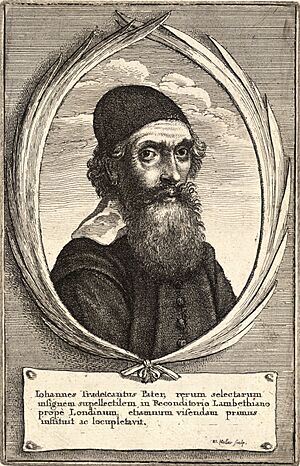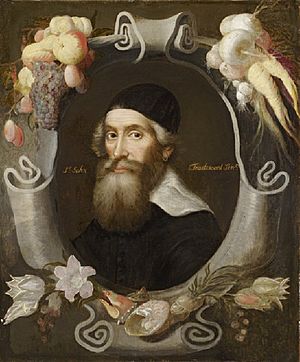John Tradescant the Elder facts for kids
John Tradescant the Elder ( /trəˈdɛskənt/) was an English naturalist, gardener, and collector. He was also a traveler who explored many places. He lived from about the 1570s to 1638. His son, John Tradescant the Younger, followed in his footsteps. John Tradescant married Elizabeth Day in 1607.
Contents
His Amazing Life
John Tradescant was likely born in Suffolk, England. He started as a head gardener at Hatfield House. This was for a powerful person named Robert Cecil. Robert Cecil sent him to the Low Countries (like modern-day Netherlands) to find fruit trees. This trip began Tradescant's love for travel. He also designed gardens for other important people.
In 1623, Tradescant became the gardener for George Villiers, 1st Duke of Buckingham. He redesigned gardens at places like New Hall, Essex. Tradescant traveled a lot for his work. He went to Arctic Russia in 1618. He also visited the Levant and Algiers in 1620. Later, he went to Paris and the Île de Ré.
After Buckingham passed away, King Charles I hired Tradescant. In 1630, he became the Keeper of His Majesty's Gardens. This job was at the queen's palace, Oatlands Palace in Surrey.

The Ark and His Collections
On all his trips, John Tradescant collected seeds and bulbs. He also gathered many interesting objects. These included items from nature and different cultures. He kept his large collection in a house called "The Ark." This house was in Lambeth, London.
"The Ark" was like an early museum. It was called a "Cabinet of Curiosity." It was the first museum in England open to the public. It was later named the Musaeum Tradescantianum. He received items from American colonists, like his friend John Smith.
John Tradescant and his son had a botanical garden in Lambeth. It was on the south bank of the Thames. From this garden, they brought many new plants to England. These plants are still common in gardens today.
John Tradescant the Elder is buried in the churchyard of St-Mary-at-Lambeth. His son is also buried there. This churchyard is now known as the Garden Museum.
His Lasting Legacy
John Tradescant's collection grew even bigger with his son's help. Later, it was given to the University of Oxford by Elias Ashmole. This collection joined an older university collection. Together, they became the Ashmolean Museum, which opened in 1683.
A group of flowering plants was named after John Tradescant and his son. The genus Tradescantia was named by Carl Linnaeus in 1752.
Tradescant Road in Vauxhall marks the old boundary of their estate.
In Popular Culture
John Tradescant is a character in the novel Earthly Joys by Philippa Gregory.
See also
- Edward Lhuyd – curator of the Ashmolean Museum
 | Dorothy Vaughan |
 | Charles Henry Turner |
 | Hildrus Poindexter |
 | Henry Cecil McBay |


